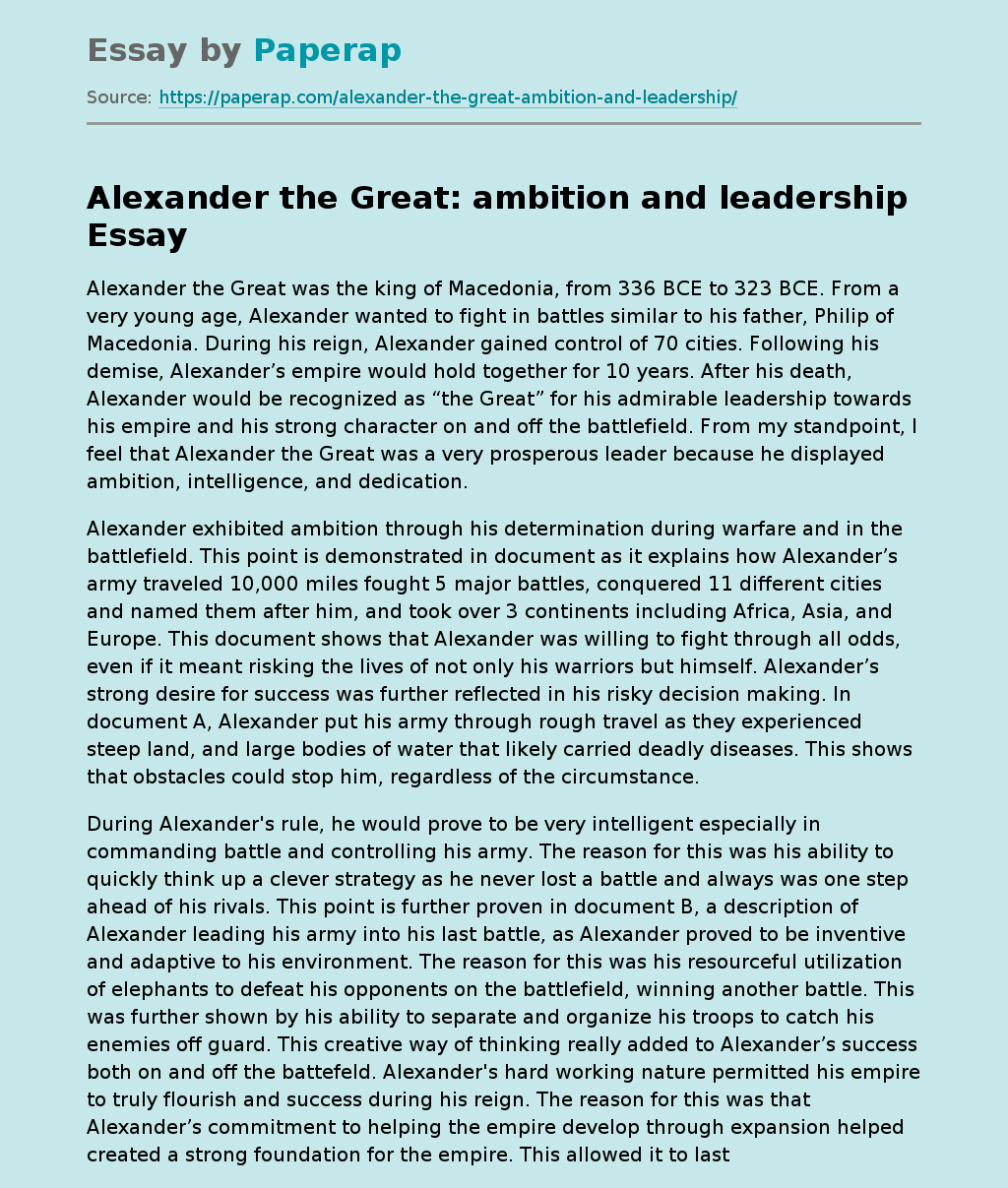Alexander the Great: ambition and leadership
Alexander the Great was the king of Macedonia, from 336 BCE to 323 BCE. From a very young age, Alexander wanted to fight in battles similar to his father, Philip of Macedonia. During his reign, Alexander gained control of 70 cities. Following his demise, Alexander’s empire would hold together for 10 years. After his death, Alexander would be recognized as “the Great” for his admirable leadership towards his empire and his strong character on and off the battlefield. From my standpoint, I feel that Alexander the Great was a very prosperous leader because he displayed ambition, intelligence, and dedication.
Alexander exhibited ambition through his determination during warfare and in the battlefield. This point is demonstrated in document as it explains how Alexander’s army traveled 10,000 miles fought 5 major battles, conquered 11 different cities and named them after him, and took over 3 continents including Africa, Asia, and Europe. This document shows that Alexander was willing to fight through all odds, even if it meant risking the lives of not only his warriors but himself.
Alexander’s strong desire for success was further reflected in his risky decision making. In document A, Alexander put his army through rough travel as they experienced steep land, and large bodies of water that likely carried deadly diseases. This shows that obstacles could stop him, regardless of the circumstance.
During Alexander’s rule, he would prove to be very intelligent especially in commanding battle and controlling his army. The reason for this was his ability to quickly think up a clever strategy as he never lost a battle and always was one step ahead of his rivals.
This point is further proven in document B, a description of Alexander leading his army into his last battle, as Alexander proved to be inventive and adaptive to his environment. The reason for this was his resourceful utilization of elephants to defeat his opponents on the battlefield, winning another battle. This was further shown by his ability to separate and organize his troops to catch his enemies off guard. This creative way of thinking really added to Alexander’s success both on and off the battefeld. Alexander’s hard working nature permitted his empire to truly flourish and success during his reign. The reason for this was that Alexander’s commitment to helping the empire develop through expansion helped created a strong foundation for the empire. This allowed it to last much longer than most presumed. This was shown in document E, a list of Alexander’s successes during his empirical reign, as Alexander was capable of maintaining a prosperous empire so much so that it lasted 10 years following his death.
Although, it took Alexander over 11 years to construct such a thriving and stable empire. His dedication also resulted in vast empirical territory claims on over 2,200,000 sq. miles of land. Alexander’s loyalty to his empire would be it’s leading cause for prosperity and triumph. Alexander has proven time and time again that his strong leadership role guided his empire to success. Alexander’s ability to demonstrate skillful organization of his armies, risk taking and hard working nature permitted his empire to truly flourish during and after his reign. Overall, Alexander the great was truly a great leader and king to his people. His loyalty and obedience consequently resulted in his empire’s success. His legacy was far reaching, he conquered the Persian empire, and spread Hellenistic culture for all to share his renowned tales of success and triumph.
Alexander the Great: ambition and leadership. (2021, Dec 08). Retrieved from https://paperap.com/alexander-the-great-ambition-and-leadership/

